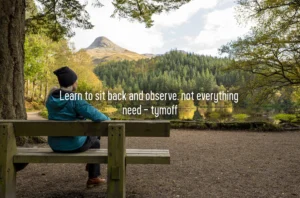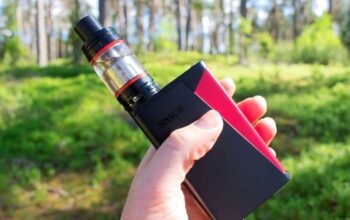
Introduction
In today’s fast-paced world, where responses and opinions seem to fly at the speed of light, the ability to sit back and observe is becoming an underrated skill. Learn to Sit Back and Observe. Not Everything Need – Tymoff allows us to pause, assess, and truly understand situations before reacting. It is not a sign of weakness but a mark of emotional intelligence and maturity. By choosing to observe rather than react, we often discover deeper insights about the people and events around us.
Why Reactivity Can Be Detrimental
Reacting impulsively to situations, Learn to Sit Back and Observe. Not Everything Need – Tymoff whether in personal relationships or professional settings, often leads to misunderstandings and unnecessary conflict. When emotions dictate immediate responses, clarity and logic take a back seat. This habit can strain relationships, damage reputations, and create regret. By learning to hold back our immediate impulses, we create space for thoughtful engagement, which often leads to better outcomes.
Observation as a Tool for Growth
Learn to Sit Back and Observe. Not Everything Need – Tymoff without reacting fosters growth on multiple levels. It sharpens critical thinking skills and enhances emotional stability. For instance, in a workplace scenario, a leader who observes employee behavior before addressing an issue is more likely to identify the root cause and provide constructive feedback. Similarly, in personal relationships, understanding a situation fully before responding can prevent arguments and foster harmony.
The Science Behind Observation and Reaction
Scientific studies suggest that the brain’s amygdala, Learn to Sit Back and Observe. Not Everything Need – Tymoff responsible for processing emotions, often triggers reactions before the rational prefrontal cortex can weigh in. Practicing mindfulness and observation rewires these neural pathways, promoting thoughtful responses over knee-jerk reactions. Over time, this habit reduces stress and improves decision-making, as individuals become more adept at managing their emotions.
Learning to Detach and Stay Neutral
 Detachment does not mean indifference but rather cultivating a sense of neutrality. Learn to Sit Back and Observe. Not Everything Need – Tymoff By stepping back and observing, we distance ourselves from the emotional turbulence of a situation, gaining a clearer perspective. This detachment allows us to make unbiased decisions and reduces the likelihood of being manipulated by external factors.
Detachment does not mean indifference but rather cultivating a sense of neutrality. Learn to Sit Back and Observe. Not Everything Need – Tymoff By stepping back and observing, we distance ourselves from the emotional turbulence of a situation, gaining a clearer perspective. This detachment allows us to make unbiased decisions and reduces the likelihood of being manipulated by external factors.
Practicing Observation in Challenging Situations
Difficult situations often test our ability to observe rather than react. Learn to Sit Back and Observe. Not Everything Need – Tymoff Whether it’s an argument with a loved one or facing criticism at work, the urge to defend or counterattack can be overwhelming. However, by taking a moment to breathe and assess, we can respond in a way that resolves rather than escalates the issue.
Observation as a Path to Mindfulness
Observation aligns closely with mindfulness, a practice that encourages living in the present moment. Learn to Sit Back and Observe. Not Everything Need – Tymoff Mindfulness teaches us to observe our thoughts, emotions, and surroundings without judgment. This state of awareness enhances our ability to handle challenges calmly and constructively, making observation a cornerstone of personal and professional success.
Letting Go of the Need for Control
One reason people struggle to sit back and observe is the innate desire to control outcomes. Learn to Sit Back and Observe. Not Everything Need – Tymoff However, not every situation requires intervention. Sometimes, allowing events to unfold naturally yields better results. Trusting the process and letting go of control is a liberating experience, teaching us patience and humility.
The Role of Patience in Observing
Observation requires patience, Learn to Sit Back and Observe. Not Everything Need – Tymoff a virtue that is increasingly rare in a world driven by instant gratification. Patience allows us to wait for the right moment to act or speak, ensuring that our contributions are meaningful and impactful. It also helps us understand that not every situation requires immediate resolution.
Transforming Relationships Through Observation
Relationships thrive when people feel heard and understood. Learn to Sit Back and Observe. Not Everything Need – Tymoff By observing rather than reacting, we create a safe space for open communication and mutual respect. This approach can diffuse tension, build trust, and deepen connections. It also helps us identify patterns and address underlying issues constructively.
Observation in Leadership and Decision-Making
Effective leaders are skilled Learn to Sit Back and Observe. Not Everything Need – Tymoff. They listen to their teams, analyze situations thoroughly, and act with purpose. This approach not only inspires confidence but also fosters a culture of trust and collaboration. Leaders who rush into decisions without observing often face resistance or failure, highlighting the importance of thoughtful analysis.
Overcoming the Fear of Inaction
Many people equate observation with passivity, fearing that it makes them appear weak or disengaged. In reality, Learn to Sit Back and Observe. Not Everything Need – Tymoff is an active process that requires focus, discipline, and emotional strength. By learning to observe, we empower ourselves to act with intention rather than out of fear or habit.
Cultivating Observation as a Lifelong Skill
Like any skill, observation requires practice and commitment. Learn to Sit Back and Observe. Not Everything Need – Tymoff Start by setting small goals, such as pausing before responding to emails or consciously listening in conversations. Over time, these habits will become second nature, enhancing your ability to navigate complex situations with grace and confidence.
The Ripple Effect of Observation
The benefits of Learn to Sit Back and Observe. Not Everything Need – Tymoff extend beyond personal growth. When we model this behavior, it encourages others to do the same, creating a ripple effect of thoughtful communication and decision-making. In teams, families, and communities, this shift can lead to greater harmony and understanding.
Conclusion
Learn to Sit Back and Observe. Not Everything Need – Tymoff is not about doing less; it’s about doing better. It’s a practice of restraint, mindfulness, and intentionality that can transform how we interact with the world. By embracing observation, we gain clarity, reduce stress, and build stronger, more meaningful connections. In a reactive world, the ability to pause and reflect is a true superpower.
You May Also Read: Aniwatch


